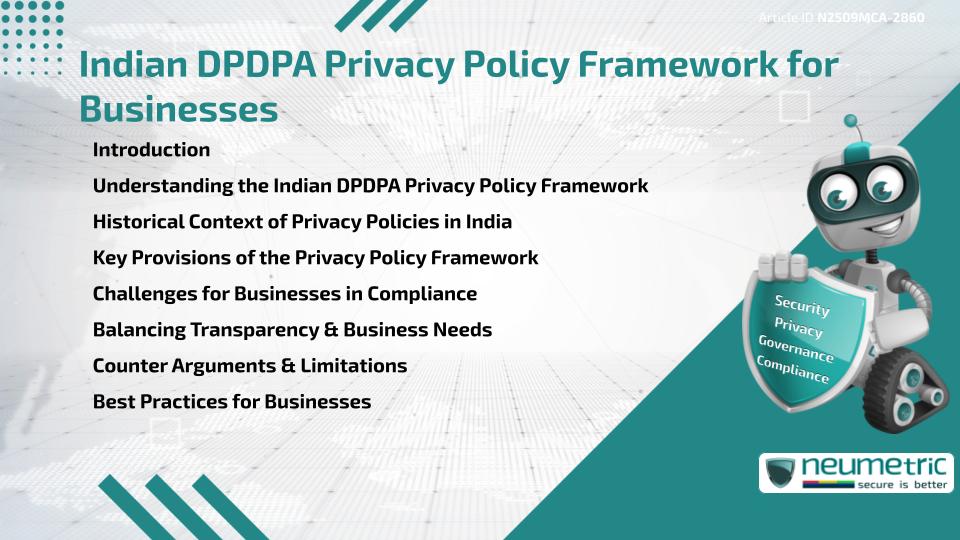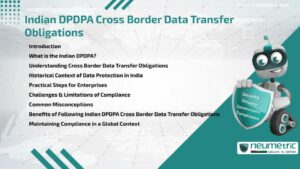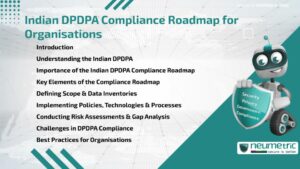Table of Contents
ToggleIntroduction
The Indian DPDPA Privacy Policy Framework is a cornerstone of the Digital Personal Data Protection Act [DPDPA], designed to ensure businesses inform Individuals about How their Data is collected, used, stored & shared. Transparency is central to building trust with Customers & the Law requires businesses to maintain Clear, Accessible & Accurate Privacy Policies. This article explores the Framework’s Background, Provisions, Challenges & Best Practices for Compliance.
Understanding the Indian DPDPA Privacy Policy Framework
The Indian DPDPA Privacy Policy Framework ensures that Data Principals, Individuals whose Personal Data is Processed, are aware of their rights & the obligations of businesses, referred to as Data fiduciaries. A Privacy Policy must cover What Data is collected, Why it is collected, How it is used & How long it will be retained.
Historical Context of Privacy Policies in India
Before the DPDPA, Privacy Policies in India were largely governed by the Information Technology Act, 2000 & its Rules on “Sensitive Personal Data.” These Rules lacked consistency & clarity, leading to varied practices across Industries. Inspired by Global Frameworks such as the European Union’s General Data Protection Regulation [GDPR], the Indian DPDPA Privacy Policy Framework creates a standardised approach to Data Transparency.
Key Provisions of the Privacy Policy Framework
Businesses must:
- Draft Privacy Policies in Clear & Simple Language.
- Provide details on Data Collection, Retention & Sharing Practices.
- Explain the Rights of Data Principals, including Consent Withdrawal & Correction.
- Disclose Third Party sharing arrangements, if any.
- Ensure Policies are accessible in Multiple Languages when required.
These provisions aim to Empower Individuals with Knowledge about their Personal Data while ensuring businesses remain accountable.
Challenges for Businesses in Compliance
While the Framework is essential, businesses often face difficulties such as:
- Translating Legal requirements into User-friendly Language.
- Updating Policies regularly to match evolving Practices.
- Managing Compliance costs, especially for Small Enterprises.
- Coordinating across Departments to ensure consistent implementation.
Balancing Transparency & Business Needs
The Framework demands openness, but businesses must also protect Confidential Operational details. For example, while a company must disclose that it shares Customer Data with Payment Processors, it does not need to reveal specific Contractual Terms. Balancing Transparency with Operational Confidentiality helps businesses remain Compliant without risking Sensitive Business Strategies.
Counter Arguments & Limitations
Some critics argue that lengthy & complex Policies discourage users from reading them, even when drafted in good faith. Others point out that the Framework leaves room for interpretation, leading to uneven enforcement across Industries.
Best Practices for Businesses
To strengthen Compliance, businesses should:
- Use layered Policies, with Summaries for easy reading & detailed Sections for full Compliance.
- Provide Privacy notices at relevant points of Data collection.
- Regularly Audit & Update Privacy Policies.
- Ensure that Employees are Trained to align practices with Policy commitments.
Conclusion
The Indian DPDPA Privacy Policy Framework is essential for Building Trust between businesses & Customers. By adopting clear, accessible & regularly updated Policies, businesses can ensure Compliance, minimize Risks & Demonstrate Accountability in their Data Practices.
Takeaways
- The Indian DPDPA Privacy Policy Framework mandates clear, accessible disclosures.
- Policies must explain collection, retention, sharing & rights of individuals.
- Businesses face Challenges in language, updates & costs.
- Best Practices include layered Policies, Timely Audits & Staff Training.
FAQ
What is the Indian DPDPA Privacy Policy Framework?
It is a legal requirement ensuring businesses provide transparent Information on how Personal Data is collected, used & shared.
Why is a Privacy Policy important for businesses?
It builds trust with Customers, ensures Compliance & Reduces Risks of legal Penalties.
What details must be included in a Privacy Policy?
Details on Data collection, retention, sharing practices & rights of Data principals.
Do Policies need to be in Multiple Languages?
Yes, if the business serves diverse audiences, Policies must be accessible in required languages.
How often should businesses update their PrivacyPolicies?
Policies should be updated regularly to reflect changes in practices or regulations.
Are Small Businesses also required to comply?
Yes, though obligations may vary depending on the Scale & Type of Data processing.
References
- Digital Personal Data Protection Act – Ministry of Electronics & Information Technology
- India’s Data Protection Law Overview – Internet Society
- General Data Protection Regulation – European Commission
- Privacy Policies & Data Rights – Electronic Frontier Foundation
- OECD Guidelines on Privacy & Data Flows
Need help for Security, Privacy, Governance & VAPT?
Neumetric provides organisations the necessary help to achieve their CyberSecurity, Compliance, Governance, Privacy, Certifications & Pentesting needs.
Organisations & Businesses, specifically those which provide SaaS & AI Solutions in the Fintech, BFSI & other regulated sectors, usually need a CyberSecurity Partner for meeting & maintaining the ongoing Security & Privacy needs & requirements of their Enterprise Clients & Privacy conscious Customers.
SOC 2, ISO 27001, ISO 42001, NIST, HIPAA, HECVAT, EU GDPR are some of the Frameworks that are served by Fusion – a SaaS, multimodular, multitenant, centralised, automated, CyberSecurity & Compliance Management system.
Neumetric also provides Expert Services for technical Security which covers VAPT for Web Applications, APIs, iOS & Android Mobile Apps, Security Testing for AWS & other Cloud Environments & Cloud Infrastructure & other similar scopes.
Reach out to us by Email or filling out the Contact Form…





